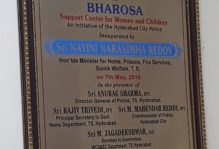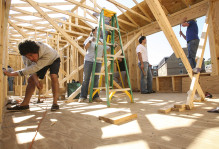Skills of Freedom
A year ago, I gave this assignment to students in my community engagement course:
Select and practice one skill that you believe will support your own growth and freedom and/or your work for the freedom of others. Over the course of the semester, you will make a plan for practicing the skills, seek feedback from your peers, and reflect on your experience.
The assignment was inspired by our first class text: the 2017 Convocation remarks of The Honorable John Charles Thomas.
I am incredibly excited to have Justice Thomas join us again for Convocation and to provide this assignment once again to my students.
Here are some of the reflections students shared last fall.
First, on the skills they chose and why:
“The skill I have chosen to practice this semester is improving my American Sign Language skills. I started practicing ASL this summer because I had a deaf camper who was just starting to sign. While my co-staff knew sign language fluently, I wanted to learn basic phrases to make my camper feel comfortable and included in the group. Realizing how much it meant for her to be able to communicate with us showed me that this practice could so easily allow others to feel safer and more accommodated in spaces that I never had to question my place in.”
–
“I really want to focus on developing my reading ability…It’s very embarrassing to admit this but I never read any book unless it is part of a class or unless I think that the book will be useful industry knowledge for my career. I want to dive into authors like James Baldwin, Toni Morrison, and others who are important storytellers [who] would offer a perspective that is different from my own.”
–
“Over the course of my life, I have been almost entirely sports driven. Whether it be soccer, basketball or baseball, I have jammed my schedule daily with these athletic activities since youth… Over this semester I am going to try and learn how to paint.”
–
“I have chosen to begin studying Spanish as a way of fostering my own freedom as well as the freedom of others. For me, verbal communication has always been the way I best connect with people. Being able to speak Spanish, even if it’s just a little bit at first, will allow me the freedom to interact with more people, and in doing so, encourage the freedom of others.“
And their reflections midway through the semester after conversations with others:
“My understanding of the language has changed since I’ve started working on it daily. I am now becoming more aware of public spaces that are unable to accommodate towards deaf individuals, and the barrier this poses for millions of individuals. This has made me recognize the true significance of learning about the language and culture of Deaf individuals.”
–
“The skill I selected was to read more books, particularly books that were more radical and offered different perspectives. I thought putting this goal in place would be enough of a motivator but to be very honest, I have not been as good as I had hoped… My best friend,…who inspired me to undertake the skill of freedom,…recommended that I join her “feminist society book club”. I am going to the first meeting next Tuesday.”
–
“[My classmate] and I both chose to practice different languages as our skills of freedom. I chose Spanish and she chose American Sign Language. One thing that stood out to me about this choice was how low-stakes that decision was for both of us. Not in the sense that neither of us is prioritizing that practice, but that neither of us really needs to prioritize that practice, if that makes any sense. No matter how well (or poorly) we acquire our new skill, we can both rest assured that there’s virtually no situation we’re ever going to be faced with that urgently requires us to be able to use those skills. We both speak English, and in most scenarios worldwide, that’s enough to get by. However, if the situation were reversed, and I was a Spanish speaker in the US, I would definitely need to know at least a little bit of English. There’s inherent privilege in me being able to pick this up as a fun hobby compared to a Spanish speaker needing to know English to get around the US.”
–
“My mom particularly seemed to love that I was expanding my horizons and seeking out enhanced freedom. She also was an avid fan of this exercise and the process of thinking about skills of freedom. So much so that she implemented it in a workshop… Part of what makes this activity so valuable is that in order to develop your freedom, you must create a definition of what freedom means to you.”
Finally, some of their closing thoughts:
“Focusing on developing my skill within the framework of my own freedom was a fascinating experience. Meditation is not often thought of as a skill, nor as a skill of freedom. After my experience developing my meditation skills, I can wholeheartedly conclude that meditation is unique in its ability to provide an immense amount of personal freedom to the individual who is practicing.”
–
“Developing a skill such as this felt powerful, as I was taking control of an aspect of my life and enhancing my ability to focus on what is important, and take care of my health. With school online, there is plenty of screen time in one day, paired with the election it is easy to get wrapped up in the media and create anxiety. The freedom of being able to step away from that and ponder on my own thoughts of what could happen and how I felt about it all rather than the media telling me felt powerful. Moving forward, I do not want to lose this skill.”
–
“What kept me coming back every day, though, even if it was for less time than I would have hoped for at the beginning of the semester, was the fact that I had committed to doing this as a “skill of freedom.” This wasn’t just a fun little habit I was trying to pick up, but genuinely something that could improve the lives of others. Over the years I’ve tried to pick up a pretty wide variety of new hobbies and skills, but it was definitely a new experience to frame it so specifically as a way of serving others, and I enjoyed it.”




No comments.
Comments are currently closed. Comments are closed on all posts older than one year, and for those in our archive.